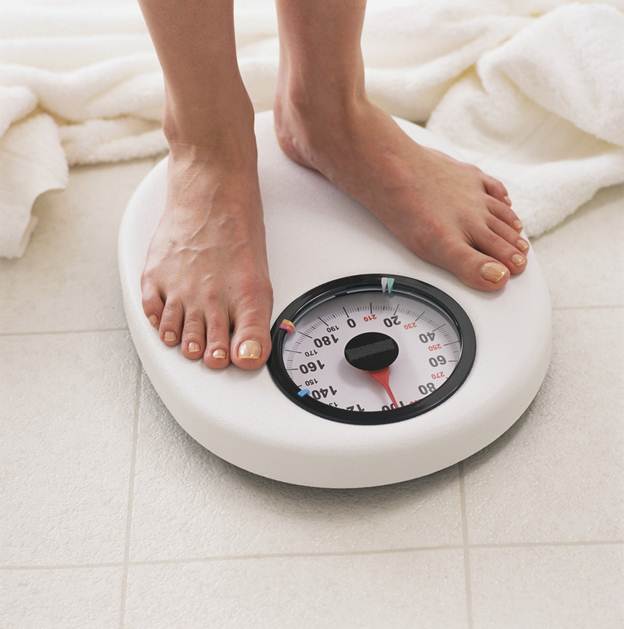When the scale comes between you and your relationship?
Look back at your wedding pictures. Do you
find yourself unable to recognize the slim, vital people saying their vows, and
wondering how they could have been replaced by the more - ahem - well-padded people
populating your current family albums?
If your answer is "yes", you'll
probably find yourself in good company. It's a sad fact that the bodies we moaned
about in our twenties come to seem beautiful with the passage of time.
Lila Bruk, a Johannesburg-based dietician, explains:
"The body naturally loses muscle mass as we age. Our metabolic rate is largely
determined by the amount of muscle in our body - so, as we age, we burn calories
more slowly and it becomes more difficult to keep the weight off."
Of course, there are other reasons why your
post-wedding self appears to have little in common, from a physical perspective,
with that of your days as a singleton. Psychologist Lorian Phillips notes: "As
a single person, you may have been aware of the need to 'market' yourself by
always looking your best."
It might sound callous to say that the pressure's
off once you've snagged your man, and while, certainly, no one would advise a
new bride that she can now start letting herself go, there are steps
that can be taken. However, life coach Judy Klipin (www.judyklipin.com) points
out that the life of a singleton is rather different from that of her married counterparts.
"When you're single, you spend a lot of time out and about - meeting friends,
stopping somewhere for drinks, going to gym. Married women, on the other hand,
are likely to spend more time at home."

Weight MATTERS
Instead of grabbing a bowl of cereal for supper,
you'll probably tuck into a hearty meal - not forgetting all those nights nesting
on the couch with the buttered popcorn.
"Often, people fall into the trap of
thinking, 'if I were better, things would be better'," Klipin continues, adding
that this is something that may particularly affect single women who feel that their
lives would improve if they were more attractive or accomplished. "In this
sense, the contentment and complacency that married people may succumb to isn't
a bad thing."
The weighty situation often intensifies
after pregnancy, when some women battle to shed their "pregnancy pounds".
Somehow, in between trying to keep up with work and children's schedules, losing
those kilograms becomes less of a priority. Putting them on seems all too easy,
however - who hasn't nibbled a bit of whatever's on their child's plate in a bid
to get him to eat, or finished off the leftovers, rather than waste them?
At the same time, says Klipin, women have a
tendency to put the needs of others before their own, so while you may be picking
up the groceries and making sure that the kids get to their extramurals on time,
the hour that you'd scheduled for gym slips by unnoticed. And if you have to grab
a salty snack to keep you going, because there simply isn't time for anything
more nutritious, well, that's just the way it is, isn't it?
“As a single person, you may have
been aware of the need to ‘market’ yourself by always looking your best”
Just The "Weigh" It Is
For some people, this is no big deal. No doubt
you have friends who chuckle over how they "really shouldn't", while
gleefully unwrapping a Ferrero Rocher. Sure, they don't look the same as they
did 10 years ago, but they're not particularly fussed. On the other hand, says Phillips,
women who tend towards "perfectionism" might view the kilogram creep in
a more serious light. Perhaps they're the ones who, every morning, bombard their
husbands with the dreaded question: "Do I look fat in this?"
"After my second caesar, it took far
longer for my stomach muscles to knit together. Although my husband wasn't concerned
about it, I nagged him every day about my appearance. It came to be a real irritation
for him. Eventually, when I asked if we could start trying for our third child,
one of his concerns was that I would put him through the same process,"
recalls Gina*, a Cape Town estate agent.
For other women, weight gain is devastating.
If, as Klipin has suggested, it has come about through self-neglect, there are already
subconscious negative perceptions at play. "If you are always putting yourself
last, what does that say about your self-worth and your sense of importance?"
Klipin asks. Throw in the lack of confidence that many of us feel when having
an "off day", and it's easy to understand how feelings of shame may
arise, ultimately leading to social withdrawal.
“A friend’s comments about our
appearance won’t have nearly as much impact as a partner’s because of the
sexual dynamic between men and women”